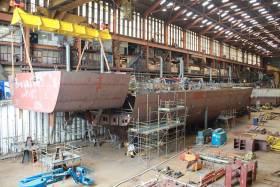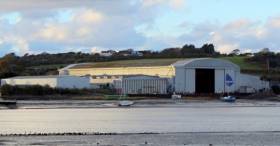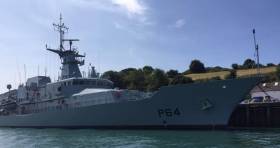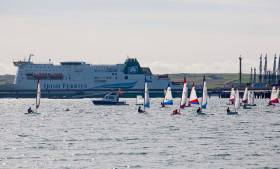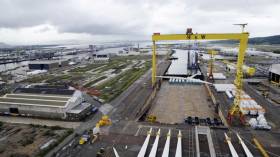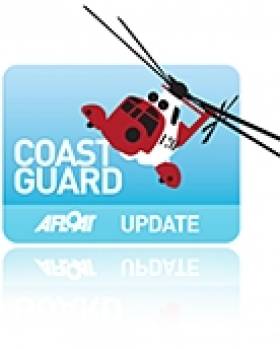Displaying items by tag: UK government
UK Shipyard of Appledore in Devon Close to Reopening
In the UK at the Appledore shipyard in Devon, the facility is close to reopening, 12 months after its 164-year shipbuilding history appeared to have come to an end.
The shipyard could reopen as soon as December if a deal is secured, although the terms may not be finalised for a fortnight or more, as the Guardian understands.
The future of the shipyard, which made components for HMS Queen Elizabeth and the new generation of aircraft carriers (and Afloat adds patrol vessels for the Irish Naval Service), came under threat after Babcock International, a FTSE 250 defence and outsourcing company, chose not to renew its lease in November 2018.
Multiple parties are understood to be in involved in talks about taking on the shipyard, including a consortium led by Devon-based shipbuilders House of Santon Maritime, according to two sources. House of Santon did not respond to requests for comment.
For further reading on this development click here.
UK Trade Union Welcomes New Hope for Appledore Shipyard
In the UK, the union for shipbuilders GMB has welcomed reports of hopes for the reopening of Appledore Shipyard, writes North Devon Gazette.
The news follows a high level meeting convened by Torridge MP and Attorney General Geoffrey Cox at 10 Downing Street last Friday (Sept 27) with the Government's taskforce dedicated to reopening the shipyard.
Afterwards Mr Cox said he was 'cautiously optimistic' about its future and was hopeful the yard could reopen.
Earlier this month, shipyard workers learned the 'bittersweet' news that former owners Babcock had been selected as the preferred bidder to provide the Government with five Type 31 frigates.
The GMB said it had campaigned to save the yard since the closure was announced last year, handing in a 10,000 strong petition to Parliament, and suggesting several plans to keep the shipyard viable.
More here on the north Devon shipyard whose final ship was the Irish Naval Service OPV LÉ George Bernard Shaw. The P60 class made a delivery voyage almost a year ago to Cork Harbour.
Hopes UK Shipyard in Appledore Could Reopen After Top Level Government Meeting
In the UK, a Torridge MP is ‘cautiously optimistic’ Appledore Shipyard will reopen in the near future after a crucial meeting at Downing Street.
As the North Devon Gazette reports, it follows a high level meeting convened by Geoffrey Cox at 10 Downing Street (yesterday) with the UK Government's taskforce dedicated to reopening the shipyard.
The taskforce, led by SW Business Council chairman Tim Jones has been working with the MP since the withdrawal of operator Babcock and the closure of the yard in March this year to secure new owners and to provide the Yard with a stable future.
Mr Cox, who has met potential owners and new customers to secure their support for the Yard over recent months has said that he is now 'cautiously optimistic' about its future, particularly as the Government has announced its intention to revive British shipbuilding.
The meeting heard from the Mr Cox of the shipbuilding heritage on the Torridge and its importance to the local economy.
For on this story can be read here.
Operator Irish Ferries Among Firms Approved by UK Govt to Bid For Brexit Freight Contracts
A total of eight ferry, aviation and rail firms have been approved to bid for British Government contracts to import vital medicines into the UK after Brexit.
Britain's Transport Secretary Grant Shapps described the group as “high-quality and experienced” as he made the announcement.
His predecessor Chris Grayling faced calls to resign earlier this year after handing a £14 million contract to Seaborne Freight to run freight services, despite having no ships or trading history.
The eight firms appointed to a freight procurement framework are Brittany Ferries, DFDS, Irish Ferries, P&O Ferries, Seatruck and Stena, as well as aviation firm Air Charter Services and train operator Eurotunnel.
For more on the story click BreakingNews.ie
According to the British Ports Association they have welcomed the UK's Government’s announcement of “up to 10 new freeports”
(Noting Afloat adds see related story on the Irish Sea Port of Holyhead, Wales).
The BPA has developed ambitious complementary Port Enterprise and Development Zone proposals.
Commenting on the announcement, BPA's chief executive Richard Ballantyne said: “We are pleased that Ministers recognise the vital economic role that ports play and we are keen to explore with the Government how this can be boosted further. We also welcome additional focus on how ports can further support national and regional economies.
Many of the benefits of a traditional ‘free port’ can be achieved in the UK through existing processes, but we look forward to working with Government on how a UK-specific model can boost sustainable development in and around ports and add real value.
The British Ports Association is working with ports and airports on ambitious complementary proposals for ‘Port Enterprise & Development Zones’ that will support economic activity across a much wider range of ports all across the UK. These proposals contain a series of recommendations around planning, enterprise and the tax system that could be incorporated into or sit alongside a UK freeport model. As well as Teesport, ports like the Tyne, also in England and the Port of Milford Haven, Wales (see Afloat's related coverage) are at an advanced stage in looking at such options.
The potential selection of 10 UK Free Port sites could be transformational for some locations but three will need to be some balance to ensure that this ports which don’t have status are not disadvantaged. Having Free Port status could be a beneficial marketing asset which helps attract inward investment and the Government will need to satisfy itself that this is not at the expense of other UK locations. That’s why we are proposing the wider concept of a Port Zone status, alongside the Free Port proposals, at all UK Ports might be a way to encourage the industry to grow cohesively.
It will be important that any Free Port designations are industry led. The newly formed advisory Department for International Trade's Panel should therefore take a bottom up approach and avoid where possible political pressures.
Ports are also important economic hubs in their own right and are often the centre of broader economic landscape. Many businesses recognise the economic and environmental benefits of being based in and around UK ports. Ports are gateways for 95% of the UK’s international trade but are also the foundation of the wider marine economy including everything from offshore wind to marine recreation and tourism.“
Alongside the well publicised Teesport proposals other ports are pursuing free port proposals, as noted by the Department for International Trade’s press release, including the Port of Tyne in addition to Milford Haven.
At the Port of Tyne a site could support advanced manufacturing through a multiple site designation a ‘virtual free port’ which could include local manufacturers such as Nissan as Afloat previously reported regarding Brexit.
In Pembrokeshire around the UK’s largest energy port, Milford Haven, a port zone could support the oil and gas cluster, promote reshoring of some fish processing and bolster marine energy generation deployment.
#ferries - Only 10% has been put up by the Government of the cost of contingency plans being set up to avoid major disruption at one of the UK’s main cross-Channel ports in the case of a no-deal Brexit.
As the Irish Examiner writes, Mike Sellers, the director of Portsmouth International Port, said that emergency plans had been prepared in case a deal was not agreed with the EU.
But he said the Department for Transport (Dft) was refusing to acknowledge there was an issue at the Hampshire port.
Mr Sellers explained that with only 13 lorry lengths between the port and the motorway network, any delays at the border through new customs checks would cause congestion on the main route connecting the Hampshire island city.
Mr Sellers said that the Hampshire and Isle of Wight Local Resilience Forum (LRF) had developed a plan for two lorry triage processing points to be created, one at the edge of Portsmouth and the other on the A31 near Winchester, to streamline arrivals at the port.
But he said the cost of setting up the system required in a no-deal situation was £4 million while the Government had only provided £345,000 in funding.
The newspaper has more here on the major UK ferryport.
Shipbuilding: Harland and Wolff Says It Needs More Support
#BelfastLough - UK government should show greater support for shipbuilding firms after Brexit, according to the chief executive of Harland and Wolff.
As BBC News reports, Brexit offers opportunities, but the industry still needs government support, said Jonathan Guest.
A previous review recommended future naval ships should be built at UK yards, including Belfast.
Harland and Wolff hopes to be a part of a government plan to build five new Royal Navy frigates across the UK.
The new frigates would be built across different shipyards, but assembled at a central site, and ready for service by 2023.
For more on the shipyard, click here.
Online Petition Challenges Cuts to UK Coastguard Network
A campaigner on Twitter is encouraging supporters to sign an online petition against the closure of coastguard stations across the UK.
So far almost 7,000 signatures have been added to the petition started by Twitter user @Coastguard_SOS in protest at the UK government's plans to streamline the Maritime and Coastguard Agency's nationwide network of rescue centres from 19 to 11.
As previously reported on Afloat.ie, campaigners in Scotland have made a desperate plea to save the Clyde station from closure in a public consultation.
Northern Ireland's rescue command centre at Bangor on Belfast Lough is among those saved from the chop following a review of reform proposals this past summer.
But concerns remain that resources will be stretched too thin if fewer stations are responsible for broader areas.
"The revised proposals are also unacceptable not least on the basis that vital local knowledge will continue be lost and therefore lives will continue to be out at risk on our coastlines," the petition warns.


























